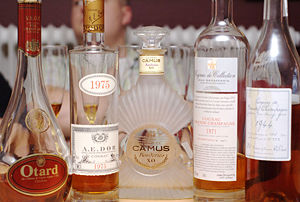Cognac (brandy): Difference between revisions
Jump to navigation
Jump to search

imported>Hayford Peirce (rewrote, for style and for accuracy) |
imported>Caesar Schinas m (Bot: Update image code) |
||
| Line 1: | Line 1: | ||
{{subpages}} | {{subpages}} | ||
{{Image|Variety of Cognac.jpg|right|300px|Various brands of Cognac.}} | |||
'''Cognac''' is an alcoholic beverage that is often known as brandy in non-French speaking countries. This is because of laws that require the names of certain alcoholic products (for example, [[Champagne]]) to be used only when that product is actually produced within a specific, and legally defined, region. True Cognac, as distinct from other types of French brandy, can only be labelled as such if it comes from a small area of western France surrounding a town called Cognac. | '''Cognac''' is an alcoholic beverage that is often known as brandy in non-French speaking countries. This is because of laws that require the names of certain alcoholic products (for example, [[Champagne]]) to be used only when that product is actually produced within a specific, and legally defined, region. True Cognac, as distinct from other types of French brandy, can only be labelled as such if it comes from a small area of western France surrounding a town called Cognac. | ||
Revision as of 05:35, 8 June 2009
Cognac is an alcoholic beverage that is often known as brandy in non-French speaking countries. This is because of laws that require the names of certain alcoholic products (for example, Champagne) to be used only when that product is actually produced within a specific, and legally defined, region. True Cognac, as distinct from other types of French brandy, can only be labelled as such if it comes from a small area of western France surrounding a town called Cognac.
Cognac, which is also sometimes called eau de vie, a French term meaning "water of life", is made from a distillation of wine.
